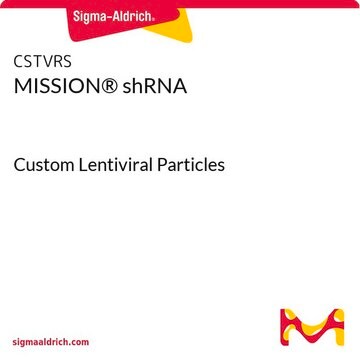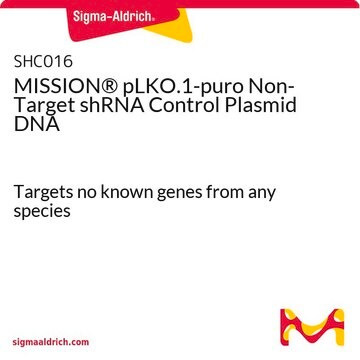SH2221
MISSION® shRNA Human Gene Family Set, DNA
Cell Adhesion Genes
Se connecterpour consulter vos tarifs contractuels et ceux de votre entreprise/organisme
About This Item
Code UNSPSC :
41106609
Nomenclature NACRES :
NA.51
Produits recommandés
Gamme de produits
MISSION®
Température de stockage
−20°C
Informations sur le gène
Vous recherchez des produits similaires ? Visite Guide de comparaison des produits
Catégories apparentées
Description générale
Sequenced-verified shRNA lentiviral plasmids (pLKO.1-puro) are provided as purified plasmid DNA suitable for virus production and transient transfection. DNA is provided in 40 μl aliquots per well in Tris,EDTA (TE) solution. An average of 2 μg per clone is provided per well with a range from 400 ng to 4 μg. The set comes in 96-well plates that are barcoded for simple identification. A CD containing RefSeq, gene description, gene symbol, clone ID, hairpin sequence, locus link, and plate map positions are provided with the gene family set.
Autres remarques
Each MISSION shRNA clone is constructed within the lentivirus plasmid vector, pLKO.1-Puro, followed by transformation into Escherichia coli. The pLKO.1-Puro vector contains bacterial (ampicillin) and mammalian (puromycin) antibiotic resistance genes for selection of inserts in either bacterial or mammalian cell lines. Each clone set consists of an average of 3-5 constructs that have been designed against each target gene using a proprietary algorithm. Therefore, a range of knockdown efficiency, with at least one construct from each gene set being >70%, can be expected when using these clones. This allows one to examine the effect of loss of gene function over a large series of gene knockdown efficiencies. Each shRNA construct has been cloned and sequence verified to ensure a match to the target gene.
For a detailed listing of other available gene family sets, visit the gene family set website.
Number of Genes: 368, Number of Clones: 2396
The exact gene and clone count at time of purchase may vary slightly as the TRC library is continually updated.
Informations légales
Use of this product is subject to one or more license agreements. For details, please see http://sigmaaldrich.com/missionlicense .
MISSION is a registered trademark of Merck KGaA, Darmstadt, Germany
Code de la classe de stockage
10 - Combustible liquids
Point d'éclair (°F)
Not applicable
Point d'éclair (°C)
Not applicable
Équipement de protection individuelle
Eyeshields, Gloves, multi-purpose combination respirator cartridge (US)
Certificats d'analyse (COA)
Recherchez un Certificats d'analyse (COA) en saisissant le numéro de lot du produit. Les numéros de lot figurent sur l'étiquette du produit après les mots "Lot" ou "Batch".
Déjà en possession de ce produit ?
Retrouvez la documentation relative aux produits que vous avez récemment achetés dans la Bibliothèque de documents.
Justyna Rak et al.
Blood, 129(8), 950-958 (2016-12-03)
Adhesion is a key component of hematopoietic stem cell regulation mediating homing and retention to the niche in the bone marrow. Here, using an RNA interference screen, we identify cytohesin 1 (CYTH1) as a critical mediator of adhesive properties in
Shaker A Mousa
Molecular biotechnology, 38(1), 33-40 (2007-12-21)
The role of cell adhesion molecules (CAM) and extracellular matrix proteins (ECM) in various pathological processes including angiogenesis, thrombosis, apoptosis, cell migration & proliferation are well documented. These processes can lead to both acute and chronic disease states such as
Marc D Basson
Cancer research, 68(1), 2-4 (2008-01-04)
Increasing evidence suggests that tumor cells can regulate their own adhesion via intracellular signals that modulate integrin binding affinity. Although the full pathway has not yet been elucidated, the effects of pressure seem likely to require cytoskeletal mechanosensing, Src, phosphatidylinositol
Notre équipe de scientifiques dispose d'une expérience dans tous les secteurs de la recherche, notamment en sciences de la vie, science des matériaux, synthèse chimique, chromatographie, analyse et dans de nombreux autres domaines..
Contacter notre Service technique








